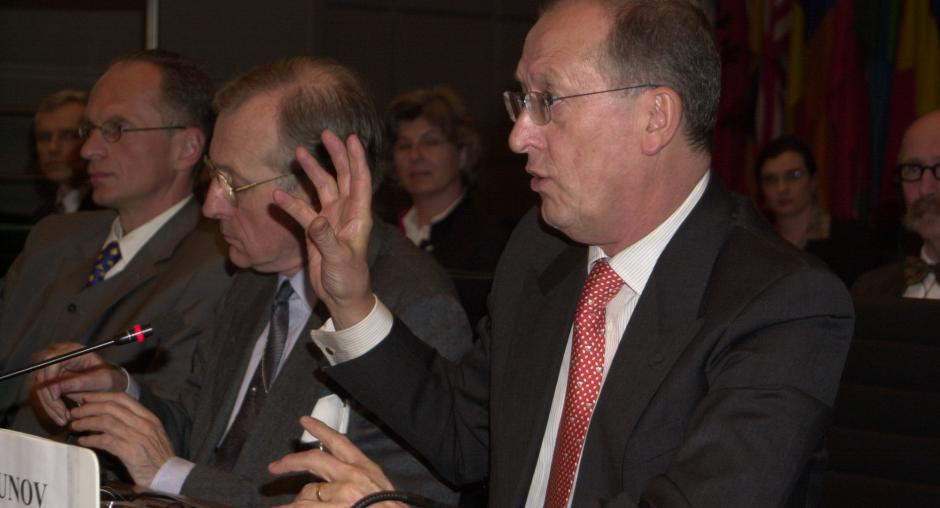Newsroom
UN ODC Director stresses "power of partnership" with OSCE
VIENNA 26 March 2003

(OSCE/Ayhan Evrensel)The Executive Director of the UN Office on Drugs and Crime, Antonio Maria Costa, addressing a special session of the OSCE's decision-making body, the Permanent Council, 25 March 2003. (OSCE/Ayhan Evrensel) Photo details
VIENNA, 26 March 2003 - Speaking at a special session of the OSCE Permanent Council, the Executive Director of the United Nations Office on Drugs and Crime (ODC), Antonio Maria Costa, described both organizations as "logical partners" in dealing with "new threats" to security.
He told the regular decision-making body of the 55-nation OSCE that the UNODC both wished and needed to work with other organizations on the basis of the comparative advantage each could bring to this "positive-sum game".
"The way I see it, UNODC and the OSCE are logical partners. The common goals of both organizations are increased safety and security for all citizens through the building of stable communities and active civil societies embedded in democratic processes and strengthened by effective law enforcement. Both organizations have consistently reinforced the same building-blocks to ensure effective governance and the rule of law, aiming to counter the growth of 'uncivil societies'."
The Vienna-based UNODC had, Mr. Costa said, identified six operational priorities, the key to which was the "power of partnership" . Among the other five he listed pursuit of an integrated approach to drugs and crime issues, placing drug and crime issues in the context of sustainable development, balancing prevention and enforcement activities, selecting operations on the basic of knowledge and strategic vision, and finally, assisting in the establishment of institutions that promote international best practice.
"The arguments for the OSCE and UNODC to act in partnership are strong", he said:
The ODC Executive Director highlighted the important work of the OSCE in Central Asia and said the knock-on effect of events in Afghanistan, in both Central Asia and Europe, was a source of deep concern for the two organizations. "The resumption of opium production on a large scale in Afghanistan (with the country now the producer of almost three-quarters of the world's opium) underscores the gravity of the situation.," he said.
But countering the problem of trafficking in human beings must also remain a focus area, he stressed. "The Balkans is a key transit area - of the estimated 700,000 women who are transported over international borders to meet the requirements of the sex trade, as many as 200,000 are taken to or through the Balkans."
The ODC Executive Director concluded: "We are both concerned with countering so-called 'new threats' to state security - preventing drug trafficking, the growth of organized crime and corruption, undercutting the trafficking in human beings and fighting terrorism. We both continue to document lessons from our ongoing work that will be useful to the work of the other. (And) important joint initiatives have provided the foundation for deepening our relationship."
He told the regular decision-making body of the 55-nation OSCE that the UNODC both wished and needed to work with other organizations on the basis of the comparative advantage each could bring to this "positive-sum game".
"The way I see it, UNODC and the OSCE are logical partners. The common goals of both organizations are increased safety and security for all citizens through the building of stable communities and active civil societies embedded in democratic processes and strengthened by effective law enforcement. Both organizations have consistently reinforced the same building-blocks to ensure effective governance and the rule of law, aiming to counter the growth of 'uncivil societies'."
The Vienna-based UNODC had, Mr. Costa said, identified six operational priorities, the key to which was the "power of partnership" . Among the other five he listed pursuit of an integrated approach to drugs and crime issues, placing drug and crime issues in the context of sustainable development, balancing prevention and enforcement activities, selecting operations on the basic of knowledge and strategic vision, and finally, assisting in the establishment of institutions that promote international best practice.
"The arguments for the OSCE and UNODC to act in partnership are strong", he said:
- "Integrated and co-ordinated processes of international co-operative efforts are more cost effective and avoid the duplication our donors abhor.
- The two organizations also deal with the same national counterparts and the OSCE co-operates extensively with the United Nations in other related areas, such as countering the trafficking in firearms.
- Joint activities with regional organizations such as the OSCE serve to broaden the audience that UNODC or the OSCE can reach individually, and multiply the impact of the work of each organization."
The ODC Executive Director highlighted the important work of the OSCE in Central Asia and said the knock-on effect of events in Afghanistan, in both Central Asia and Europe, was a source of deep concern for the two organizations. "The resumption of opium production on a large scale in Afghanistan (with the country now the producer of almost three-quarters of the world's opium) underscores the gravity of the situation.," he said.
But countering the problem of trafficking in human beings must also remain a focus area, he stressed. "The Balkans is a key transit area - of the estimated 700,000 women who are transported over international borders to meet the requirements of the sex trade, as many as 200,000 are taken to or through the Balkans."
The ODC Executive Director concluded: "We are both concerned with countering so-called 'new threats' to state security - preventing drug trafficking, the growth of organized crime and corruption, undercutting the trafficking in human beings and fighting terrorism. We both continue to document lessons from our ongoing work that will be useful to the work of the other. (And) important joint initiatives have provided the foundation for deepening our relationship."
